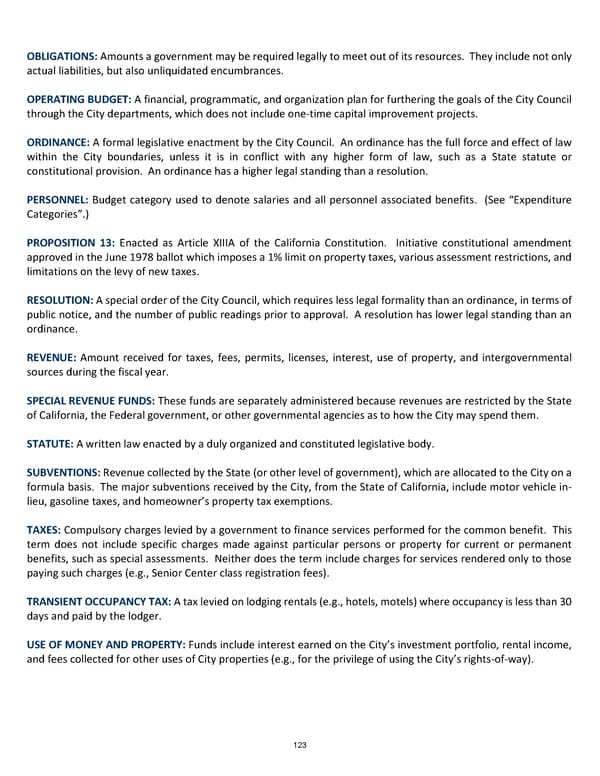OBLIGATIONS: Amounts a government may be required legally to meet out of its resources. They include not only actual liabilities, but also unliquidated encumbrances. OPERATING BUDGET: A financial, programmatic, and organization plan for furthering the goals of the City Council through the City departments, which does not include one-time capital improvement projects. ORDINANCE: A formal legislative enactment by the City Council. An ordinance has the full force and effect of law within the City boundaries, unless it is in conflict with any higher form of law, such as a State statute or constitutional provision. An ordinance has a higher legal standing than a resolution. PERSONNEL: Budget category used to denote salaries and all personnel associated benefits. (See “Expenditure Categories”.) PROPOSITION 13: Enacted as Article XIIIA of the California Constitution. Initiative constitutional amendment approved in the June 1978 ballot which imposes a 1% limit on property taxes, various assessment restrictions, and limitations on the levy of new taxes. RESOLUTION: A special order of the City Council, which requires less legal formality than an ordinance, in terms of public notice, and the number of public readings prior to approval. A resolution has lower legal standing than an ordinance. REVENUE: Amount received for taxes, fees, permits, licenses, interest, use of property, and intergovernmental sources during the fiscal year. SPECIAL REVENUE FUNDS: These funds are separately administered because revenues are restricted by the State of California, the Federal government, or other governmental agencies as to how the City may spend them. STATUTE: A written law enacted by a duly organized and constituted legislative body. SUBVENTIONS: Revenue collected by the State (or other level of government), which are allocated to the City on a formula basis. The major subventions received by the City, from the State of California, include motor vehicle in- lieu, gasoline taxes, and homeowner’s property tax exemptions. TAXES: Compulsory charges levied by a government to finance services performed for the common benefit. This term does not include specific charges made against particular persons or property for current or permanent benefits, such as special assessments. Neither does the term include charges for services rendered only to those paying such charges (e.g., Senior Center class registration fees). TRANSIENT OCCUPANCY TAX: A tax levied on lodging rentals (e.g., hotels, motels) where occupancy is less than 30 days and paid by the lodger. USE OF MONEY AND PROPERTY: Funds include interest earned on the City’s investment portfolio, rental income, and fees collected for other uses of City properties (e.g., for the privilege of using the City’s rights-of-way). 123
 FY 2024-25 Adopted Operating Budget and Capital Improvement Program Page 137 Page 139
FY 2024-25 Adopted Operating Budget and Capital Improvement Program Page 137 Page 139